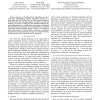Free Online Productivity Tools
i2Speak
i2Symbol
i2OCR
iTex2Img
iWeb2Print
iWeb2Shot
i2Type
iPdf2Split
iPdf2Merge
i2Bopomofo
i2Arabic
i2Style
i2Image
i2PDF
iLatex2Rtf
Sci2ools
SASO
2015
IEEE
2015
IEEE
Toward Predicting Distributed Systems Dynamics
Abstract—Systems of “building block” algorithms can guarantee that self-organizing systems eventually converge to a predictable state [1], [2], but what of their dynamical behavior in environments with ongoing changes? To begin to address this challenge, we analyze a commonly used distributed distance estimation algorithm from a stability theory perspective, identifying key properties of monotonicity and dynamical behavior envelope. This allows standard stability theory analysis to be applied to predict the behavior of the algorithm in response to persistent perturbation, both in isolation and as part of a composite system, as demonstrated both analytically and in simulation.
Related Content
| Added | 17 Apr 2016 |
| Updated | 17 Apr 2016 |
| Type | Journal |
| Year | 2015 |
| Where | SASO |
| Authors | Amy Kumar, Jacob Beal, Soura Dasgupta, Raghu Mudumbai |
Comments (0)

